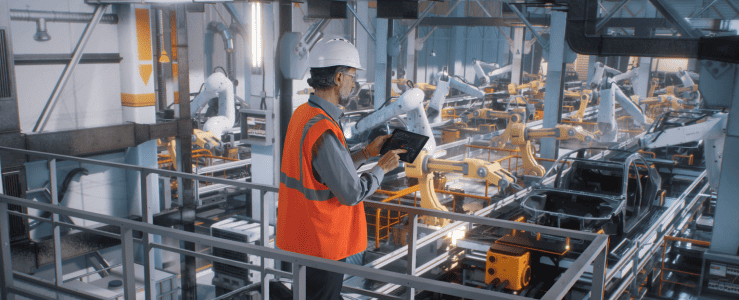Blog

Increasing Efficiency Through Automation
Want to take your manufacturing operations to the next level? Automation is the key.
Key Takeaways:
- SAP alone is insufficient for manufacturers that want to optimize their efficiency and productivity.
- Integrating SAP with Salesforce can help manufacturers automate business processes, resulting in increased efficiency and productivity.
- SAP and Salesforce integration empowers manufacturers to reduce manual effort across their teams.
- The integration of SAP and Salesforce lets manufacturers provide their employees and customers with real-time data.
- Manufacturers can ensure all data in SAP and Salesforce is kept up to date.
Manufacturers can leverage SAP to drive efficiency and productivity. But how you integrate SAP with applications across your business has far-flung effects on your ability to achieve the goals of those investments.
You need to integrate SAP with the front-end and operational systems that workers across your organization use. In doing so, you can automate many processes to improve efficiency and productivity across your business.
How automation drives efficiency and productivity
Your business processes are built on applications designed to optimize efficiency and productivity. However, different departments generally use a wide range of applications.
There is no guarantee that apps used by one department are compatible with those used by another. This can lead to miscommunications and errors that hamper business efficiency and productivity. It can also contribute to inefficient operations, poor customer experiences, and other issues that prevent your company from reaching its full potential.
You can use SAP integrations to establish workflows that automate myriad business processes. When set up and configured properly, these workflows reduce manual effort and free up your team to focus exclusively on high-value tasks.
Use SAP with Salesforce to enable real-time automation
Integrating SAP with Salesforce provides your team with a single source for business, customer, and product data. The integration centralizes data from different business processes into a single framework. So, if employees need data, they can quickly and easily access it at their convenience. The result: Your employees can make faster and more informed decisions.
In addition, you can integrate SAP with Salesforce to sync product lists, pricing rules, orders, and inventory. This ensures that your sales, finance, and customer service teams can access real-time data and use this information to perform their jobs to the best of their ability.
Let’s not forget about the ability to use SAP with Salesforce to automatically update item lists and inventories, either. For instance, if a deal is won in Salesforce, this information can be automatically sent to SAP to finalize it.
Changes in SAP can be automatically updated in Salesforce, too. For example, if SAP pricing rules or product details are updated, these changes are automatically delivered to Salesforce. This ensures that your team is always able to access the most up-to-date pricing and product information.
Why do manufacturers use SAP and Salesforce for automation?
Along with helping manufacturers become more efficient and productive, other reasons to use SAP and Salesforce to automate business processes include:
1. Business goal management
SAP and Salesforce together let you leverage accurate data to establish business goals. Integration automatically combines your product, pricing, and processing information with performance data.
Meanwhile, you can continuously collect and evaluate this information and use it to produce reports to assess your company’s performance. You can also establish benchmarks for current performance and determine what goals you want to set for the future.
2. Customer experience
Manual data entry can lead to inaccurate quotes, invoices, and orders. Conversely, integrating SAP with Salesforce ensures your customers will automatically get accurate information any time they search for it. This ensures your customers can retrieve the information they need, exactly when they need it, resulting in improved customer experiences.
Furthermore, your salespeople will benefit beyond reduced manual data entry by integrating SAP with Salesforce. With integration, your salespeople won’t have to search far and wide to look up inventory information or pricing rules that impact their accounts. Instead, they can view recent customer orders, provide status updates regarding upcoming deliveries, and communicate other pertinent information to better serve your clientele.
3. Speed
Time is limited, but SAP and Salesforce can help you get the most value out of it. Integrating SAP with Salesforce ensures your business, customer, and product information is automatically managed and kept up to date. That way, your team and your customers can instantly get timely, relevant, and accurate information.
Of course, the time you save by using SAP and Salesforce can be invested in research, development, and other high-priority areas of your manufacturing operation. This can lead to substantial improvements that allow your business to further expand.
How to integrate SAP with Salesforce
There is a lot to like about using SAP and Salesforce in manufacturing. Yet, it can be difficult to bring the two programs together. Traditional integration methods take time, money, and expertise that you’re probably better off allocating somewhere else.
The enosix platform takes the guesswork out of integrating SAP with Salesforce and other front-end applications. With our platform, you can automatically access SAP pricing and configuration rules from inside Salesforce Sales or CPQ Clouds.
enosix runs in the application layer of your business’ SAP ERP. It uses the business logic already built in your SAP ERP and ensures that your Salesforce order entry system behaves as if you are directly logged in to SAP.
Also, our platform lets you integrate SAP with Salesforce without extensive coding and configuration. As such, enosix can dramatically shorten the development and integration cycles, and your integration won’t have to learn a whole new language just to get two systems talking to each other.
The enosix team can help you leverage SAP and Salesforce to automate business processes and improve efficiency and productivity across your manufacturing operations. To learn more about how our platform can make your integration faster and easier, schedule a demo today.


